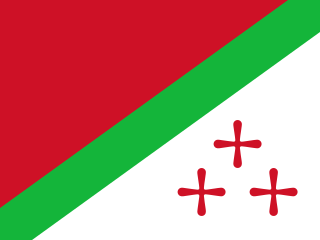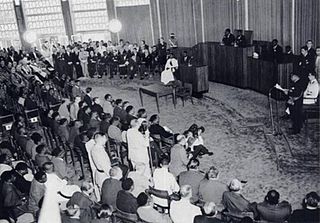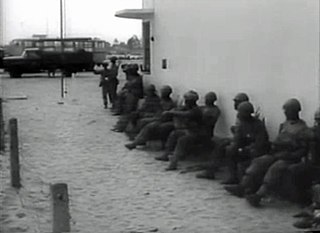
Patrice Émery Lumumba, born Isaïe Tasumbu Tawosa, was a Congolese politician and independence leader who served as the first prime minister of the Democratic Republic of the Congo from June until September 1960, following the May 1960 election. He was the leader of the Congolese National Movement (MNC) from 1958 until his execution in January 1961. Ideologically an African nationalist and pan-Africanist, he played a significant role in the transformation of the Congo from a colony of Belgium into an independent republic.

The Belgian Congo was a Belgian colony in Central Africa from 1908 until independence in 1960 and became the Republic of the Congo (Léopoldville). The former colony adopted its present name, the Democratic Republic of the Congo (DRC), in 1964.

Baudouin was King of the Belgians from 17 July 1951 until his death in 1993. He was the last Belgian king to be sovereign of the Congo, before it became independent in 1960 and became the Democratic Republic of the Congo.

Expo 58, also known as the 1958 Brussels World's Fair, was a world's fair held on the Heysel/Heizel Plateau in Brussels, Belgium, from 17 April to 19 October 1958. It was the first major world's fair registered under the Bureau International des Expositions (BIE) after World War II.

The State of Katanga, also known as the Republic of Katanga, was a breakaway state that proclaimed its independence from Congo-Léopoldville on 11 July 1960 under Moise Tshombe, leader of the local Confédération des associations tribales du Katanga (CONAKAT) political party. The new Katangese state did not enjoy full support throughout the province and was constantly plagued by ethnic strife in its northernmost region. It was dissolved in 1963 following an invasion by United Nations Operation in the Congo (ONUC) forces, and reintegrated with the rest of the country as Katanga Province.

Pierre Mulele was a Congolese rebel active in the Simba rebellion of 1964. Mulele had also been minister of education in Patrice Lumumba's cabinet. With the assassination of Lumumba in January 1961 and the arrest of his recognised deputy Antoine Gizenga one year later, Mulele became one of the top Lumumbists determined to continue the struggle. He went to Cairo as the representative of the Lumumbists' Congo National Liberation Committee based in Brazzaville. From Cairo he proceeded to China in 1963 to receive military training, and also took a group of Congolese youths with him, who received training in guerrilla tactics. Mulele was lured out of exile after Mobutu Sese Seko promised him amnesty, but Mobutu had him tortured and executed after Mulele returned to the Congo. He was a member of the Bapende ethnic group.

The Republic of the Congo was a sovereign state in Central Africa, created with the independence of the Belgian Congo in 1960. From 1960 to 1966, the country was also known as Congo-Léopoldville to distinguish it from its northwestern neighbor, which is also called the Republic of the Congo, alternatively known as "Congo-Brazzaville". In 1964, the state's official name was changed to the Democratic Republic of the Congo, but the two countries continued to be distinguished by their capitals; with the renaming of Léopoldville as Kinshasa in 1966, it became also known as Congo-Kinshasa. After Joseph Désiré Mobutu, commander-in-chief of the national army, seized control of the government in 1965, the Democratic Republic of the Congo became the Republic of Zaire in 1971. It would again become the Democratic Republic of the Congo in 1997. The period between 1960 and 1964 is referred to as the First Congolese Republic.
Léo Pétillon was a Belgian colonial civil servant and lawyer who served as Governor-General of the Belgian Congo (1952–58) and, briefly, as Minister of the Belgian Congo and Ruanda-Urundi (1958).

The Belgo-Congolese Round Table Conference was a meeting organized in two parts in 1960 in Brussels between on the one side representatives of the Congolese political class and chiefs and on the other side Belgian political and business leaders. The round table meetings led to the adoption of sixteen resolutions on the future of the Belgian Congo and its institutional reforms. With a broad consensus, the date for independence was set on June 30, 1960.

The Speech at the Ceremony of the Proclamation of the Congo's Independence was a short political speech given by Patrice Lumumba on 30 June 1960 at the ceremonies marking the independence of the Republic of Congo from Belgium. It is best known for its outspoken criticism of colonialism.
Events from the year 1972 in Belgium.

The Palais de la Nation is the official residence and principal workplace of the President of the Democratic Republic of the Congo. It is strategically situated in Gombe, north of Kinshasa, adjacent to the course of the Congo River, and has held its role since 2001, following the assassination of Laurent-Désiré Kabila.
The following lists events that happened during 1960 in the Republic of the Congo (Léopoldville).
On 13 January 1959, King Baudouin addressed the nation by radio and declared that Belgium would work towards the full independence of the Belgian Congo.
Rémy Mwamba (1921–1967) was a Congolese politician who twice served as Minister of Justice of the Democratic Republic of the Congo. He was also a leading figure of the Association Générale des Baluba du Katanga (BALUBAKAT).

On 5 July 1960, soldiers of the garrisons of Léopoldville and Thysville of the Force Publique, the army of the newly independent Republic of the Congo mutinied against their white officers. The revolt quickly spread throughout the Bas-Congo and engulfed the country in disorder, beginning the Congo Crisis.

The Lumumba Government was the first set of ministers, ministers of state, and secretaries of state that governed the Democratic Republic of the Congo under the leadership of Prime Minister Patrice Lumumba from 24 June until 12 September 1960. It was hastily formed over the period of several weeks in June, and was supported by a slight majority coalition in Parliament. Weak and divided, its tenure was dominated by a widespread mutiny in the army and two secessions.
Events in the year 1960 in Belgium.
Chevalier Jacques Joseph Brassinne de La Buissière was a Belgian political scientist, author, and civil servant.
Etienne Ugeux (1923–1998) was a Belgian journalist.












